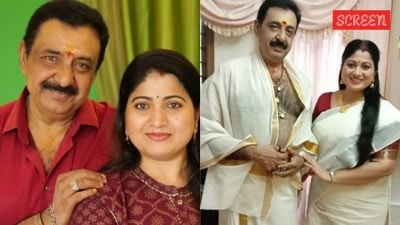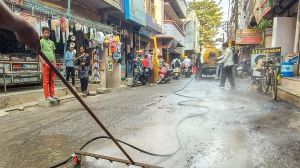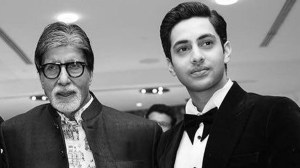For favours received
Censorship has always be-en a hot issue for the seminar circuit, the Press Council and civil liberties activists. But, while there are alw...

Censorship has always be-en a hot issue for the seminar circuit, the Press Council and civil liberties activists. But, while there are always vigilantes ready to scream foul8217; when the lathi is lifted ag-ainst the recalcitrant media, the policy of alternatively dangling and withdrawing carrots, developed into a fine art by the ruling establishment to manipulate the media, gets scant notice.
The strategy works so effectively because those who dangle the carrots have an insight into the middle-class wish list. Invitations to banquets and garden parties, junkets at home and abroad, representing the country at international seminars, travelling on board VIP aircraft with prime ministers or presidents, nominations to advisory committees on strategic affairs and highly subsidised government housing, can all become rewards for good behaviour. Even appearances on Doordarshan or contracts for TV programmes have often been converted into favours.
During an eventful six months in 1989, I gained valuable insight into the diverse methods employed by the government to control the media. An eye-opener was the official reaction to what seemed a rather innocuous item which appeared in the now defunct Indian Post newspaper8217;s diary column.
Poking mild fun at the spokesman of the Ministry of External Affairs, the diarist suggested that the official, instead of spending time and money on smartening up his already plush office, should first look into the stink emanating from the public toilet in the adjacent corridor.
The repercussions were heavy-ha-nded and swift. A courier from the ministry was at the newspaper8217;s Delhi office the next day demanding back invitation cards delivered a day earlier for a dinner to be hosted by the spokesman. He claimed that the dinner had been called off. As little in the government remains secret, we soon learnt that the dinner party was on, only journalists on the newspaper were struck off the MEA8217;s list of invitees for all such future functions and dinners. My hapless colleague, who covered the ministry and had nothing to do with the offending item, experienced truly frigid temperatures thanks to the MEA8217;s cold shoulder. His name was removed from the list of journalists accompanying the Foreign Minister on a trip abroad. Worse, he was no longer invited to the off-the-record briefings.
Hoping to improve matters, I protested to the press adviser to the Prime Minister. The official took me to lunch and expressed total sympathy with my viewpoint that, while scratching off names frominvitation lists might be considered legitimate, black-balling from briefings was unethical since it interfered with the journalist8217;s fundamental right of livelihood.
Later, I learnt that the press adviser8217;s credentials were even more suspect. He had actually flown to Mumbai to personally lodge a complaint against me to the newly appointed newspaper editor and suggest I be replaced as bureau chief. My offence: I had refused to issue a contradiction on the basis of the spokesman8217;s verbal assurance that Prime Minister Rajiv Gandhi8217;s personal secretary did not own a particular flat in Delhi. The CBI is today examining the assets of the very same personal secretary to discover whether they were disproportionate to his known source of income.During this same period, in an unrelated development, the owner of The Indian Post, a distinguished and very honourable industrialist, was flabbergasted when a politician favourite of Prime Minister Rajiv Gandhi warned that his family-owned business house would be ruined because the government was furious with The Indian Post for targeting friends of the Prime Minister, including himself.
A list was helpfully provided of people who should not be written against in future. After a report against the same politician was splashed on the front page by a subeditor who was ignorant of the special immunity list, the industrialist hastily sold the newspaper.
I learnt some valuable lessons from the whole experience. Incl-uding the knowledge that politicians are generally crude and blatant in the methods they employ to gag the Press and get caught out, while government officials are smoother and more subtle and hence more effective.
Have you ever wondered why those who cover the Ministry of External Affairs almost always spout the same arguments on foreign policy as the government? It is not so much a meeting of minds, but the fact that it has been made amply clear that dissenters will be kept out of a cosy club and access to crucial ministry sources would be denied. Three years back, as a guest artiste covering the Commonwealth meet in Edinburgh, I saw this docility in operation. Pakistan Prime Minister Nawaz Sharif was busy protesting to the world that the secretary-level talks between the two countries had broken down because India refused to discuss Kashmir as promised. It looked as if the much-vaunted Gujral doctrine was being blown to bits during I.K. Gujral8217;s own tenure as Prime Minister.
The Indian foreign secretary8217;s interpretation of events at the official briefing was reassuringly non-alarmist. There were minor differences in perception in the sequence of issues to be taken up for discussion by the two foreign secretaries which could be resolved within the stipulated framework when the two foreign secretaries met at their next one-to-one engagement, etc. Astonishingly, this was the extraordinary thrust of the news reports in a majority of Indian newspapers the next day!Again, it is curious that most of the initial exposures on cricket match-fixing have emanated not from sports correspondents.
The response of the cricket establishment to the correspondent who first reported Manoj Prabhakar8217;s allegation on match-fixing some years back was to deny him accreditation to cover the tournament in Dhaka. In business journalism, surely the freebies offered by public sector undertakings and private corporations inhibit criticism. Recently, a public sector undertaking provided a journalist with a Bharat Darshan air ticket from Delhi to Guwahati to Mangalore, Mumbai and Cochin to study oil refineries!Last fortnight, when The Indian Express was invited to accompany President K. R. Narayanan to China, my editor-in-chief forwarded my name.
But, when I eagerly telephoned the press secretary to confirm my acceptance, the embarrassed officer explained the invitation had been withdrawn. He mumbled that it was meant only for editors. Considering that the printline of the newspaper states that I am the editor of the Delhi edition, the excuse sounded rather thin. Particularly as there were several invitees to China who had not even the appendage of editor to their designations. The only mystery was which of the three snippets on Rashtrapati Bhavan I had written recently was such a grave offence.
- 01
- 02
- 03
- 04
- 05































